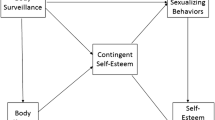Abstract
Objectification Theory (Fredrickson & Roberts, Psychology of Women Quarterly, 21:173–206, 1997) postulates that sexual objectification of women and girls in US culture contributes to women’s mental health problems indirectly through women’s internalization of objectifying experiences or self-objectification. The purpose of this study was to test the model proposed in Objectification Theory as it applies to depression in women. A path analysis revealed that self-objectification decreased with age and led to habitual body monitoring, which led to a reduced sense of flow, greater body shame, and greater appearance anxiety. Less flow, greater body shame, and greater appearance anxiety led to depression. No significant pathways were found for the theorized relationships between the self-objectification measures and internal awareness or between internal awareness and depression. In addition, we provide psychometric support for a newly created multiple-item Flow Scale to assess Csikszentmihalyi’s (Flow: The psychology of optimal experience, Harper, New York, 1990) description of the common characteristics of peak motivational states and optimal experience.

Similar content being viewed by others
References
Beck, A. T., & Beck, R. W. (1972). Screening depressed patients in family practice: A rapid technique. Postgraduate Medicine, 52, 81–85.
Brown, L. S. (1994). Subversive dialogues. New York: Basic Books.
Csikszentmihalyi, M. (1990). Flow: The psychology of optimal experience. New York: Harper.
Dion, K. L., Dion, K. K., & Keelan, J. P. (1990). Appearance anxiety as a dimension of social-evaluative anxiety: Exploring the ugly duckling syndrome. Contemporary Social Psychology, 14, 220–225.
Dugan, W., McDonald, M. V., Passik, S. D, Rosenfeld, B. D., Theobald, D., & Edgerton, S. (1998).Use of the Zung Self-Rating Depression Scale in cancer patients: Feasibility as a screening tool. Psycho-Oncology, 7, 483–493.
Enns, C. Z. (2004). Feminist theories and feminist psychotherapies: Origins, themes, and diversity (2nd ed.). New York: Haworth.
Floyd, F. J., & Widman, K. F. (1995). Factor analysis in the development and refinement of clinical assessment instruments. Psychological Assessment, 7, 286–299.
Fredrickson, B. L., & Roberts, T. (1997). Objectification theory: Toward understanding women’s lived experiences and mental health risks. Psychology of Women Quarterly, 21, 173–206.
Fredrickson, B. L., Roberts, T., Noll, S. M., Quinn, D. M., & Twenge, J. M. (1998). That swimsuit becomes you: Sex differences in self-objectification, restrained eating, and math performance. Journal of Personality and Social Psychology, 75, 269–284.
Heppner, P. P., Kivlighan, D. M., & Wampold, B. E.(1999). Research design in counseling (2nd ed.). Belmont, CA: Wadsworth.
Kozeny, J. (1987). Psychometric properties of the Zung Self-Rating Depression Scale. Activitas Nervosa Superior, 29, 279–284.
McKinley, N. M., & Hyde, J. S. (1996). The Objectified Body Consciousness Scale: Development and validation. Psychology of Women Quarterly, 20, 181–215.
Miller, L. C., Murphy, R., & Buss, A. H. (1981). Consciousness of body: Private and public. Journal of Personality and Social Psychology, 41, 397–406.
Miner-Rubino, K., Twenge, J. M., & Fredrickson, B. L. (2002). Trait self-objectification in women: Affective and personality correlates. Journal of Research in Personality, 36, 147–172.
Morry, M. M., & Staska, S. L. (2001). Magazine exposure: Internalization, self-objectification, eating attitudes, and body satisfaction in male and female university students. Canadian Journal of Behavioural Science, 33, 269–279.
Muehlenkamp, J. J., & Saris-Baglama, R. N. (2002). Self-objectification and its psychological outcomes for college women. Psychology of Women Quarterly, 26, 371–379.
Noll, S. M. (1996). The relationship between sexual objectification and disordered eating: Correlational and experimental tests of body shame as a mediator. Doctoral dissertation, Duke University, Durham, NC.
Noll, S. M., & Fredrickson, B. L. (1998). A mediational model linking self-objectification, body shame, and disordered eating. Psychology of Women Quarterly, 22, 623–636.
Parker, J. D., Bagby, R. M., & Taylor, G. J. (1991). Alexithymia and depression: Overlapping constructs? Comprehensive Psychiatry, 32, 387–394.
Pedhazur, E. J. (1997). Multiple regression in behavioral research (3rd ed.). Fort Worth, TX: Harcourt Brace.
Powell, R. (2003). Psychometric properties of the Beck Depression Inventory and the Zung Self Rating Depression Scale in adults with mental retardation. Mental Retardation, 41(2), 88–95.
Slater, A., & Tiggemann, M. (2002). A test of Objectification Theory in adolescent girls. Sex Roles, 49, 343–347.
Tabachnick, B. G., & Fidell, L. S. (2001). Using multivariate statistics (4th ed.). Needham Heights, MA: Allyn & Bacon.
Tiggemann, M., & Kuring, J. K. (2004). The role of body objectification in disordered eating and depressed mood. British Journal of Clinical Psychology, 43, 299–311.
Tiggemann, M., & Lynch, J. E. (2001). Body image across the life span in adult women: The role of self-objectification. Developmental Psychology, 37, 243–253.
Tiggemann, M., & Slater, A. (2001). A test of objectification theory in former dancers and non-dancers. Psychology of Women Quarterly, 25, 57–64.
Tinsley, H. E. A., & Tinsley, D. J. (1987). Uses of factor analysis in counseling psychology research. Journal of Counseling Psychology, 34, 414–424.
Worell, J., & Remer, P. (2003). Feminist perspectives in therapy: Empowering diverse women (2nd ed.). Hoboken, NJ: Wiley.
Zung, W. W. K. (1986). Zung Self-Rating Depression Scale and Depression Status Inventory. In N. Sartorius & T. A. Ban (Eds.), Assessment of depression (pp. 221–231). Berlin Heidelberg New York: Springer.
Acknowledgement
We thank Kathy Kufskie for her assistance with data collection.
Author information
Authors and Affiliations
Corresponding author
Rights and permissions
About this article
Cite this article
Szymanski, D.M., Henning, S.L. The Role of Self-objectification in Women’s Depression: A Test of Objectification Theory. Sex Roles 56, 45–53 (2007). https://doi.org/10.1007/s11199-006-9147-3
Published:
Issue Date:
DOI: https://doi.org/10.1007/s11199-006-9147-3




